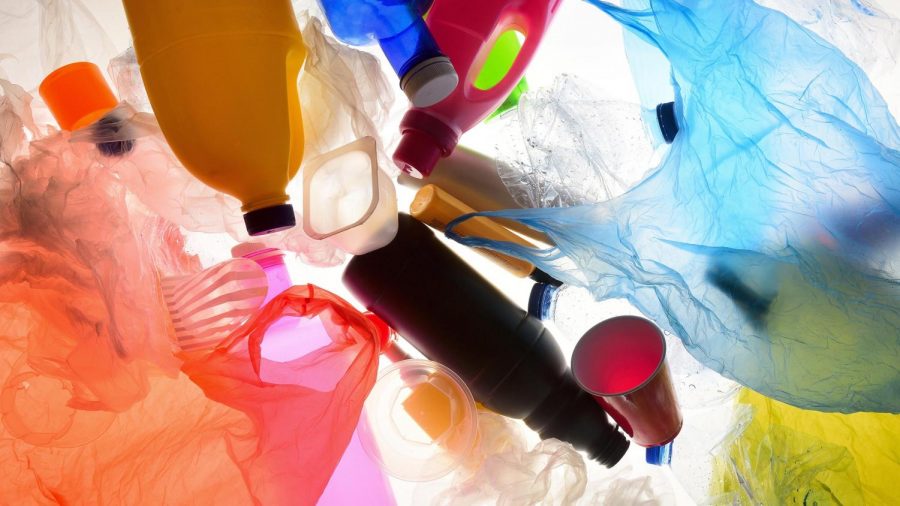Wash Your Hands and Your Plastics, Too
After careful planning and extensive measures to reopen the university, Colgate’s reopening plan and campus-wide quarantine has proven largely successful. From mail services employees working tirelessly to sort and deliver packages to volunteers bringing meals to students on time and students and faculty continuing to adhere to social-distancing guidelines, Colgate moved into Gate 1 at 7 a.m. Sept. 8. While there is much to be celebrated with our progress, the university has fallen behind in one major aspect: sustainability.
In an effort to keep things as hygienic as possible, the amount of single-use items has multiplied astronomically in the age of COVID-19. Colgate’s new dining protocols illustrate this trend. Students, many of whom were flying to campus and would not be able to grocery shop once in New York or those who would not have access to dining halls for the quarantine, had the option to opt-in to the university’s daily meal delivery program. During the universal quarantine, several single-use plastic items accompanied each of the three daily meals distributed to hundreds of students. Once received, each item was destined to be used for only a few minutes before being tossed into the garbage to spend the remainder of its life in landfills or oceans. In many cases, these single-use plastics and the food they contained were not even used or consumed, as some students disposed of them as fast as they arrived. Unsurprisingly, this caveat furthers our global plastic crisis. However, our in-person campus dining experience does not perform much better in regard to America’s food waste problem, as a shocking 40 percent of all food grown and produced never reaches the table. Not only is this a waste of resources, transportation and work, but it’s also a waste of money.
Given these unusual times, it is not completely fair to blame the university, as few practical alternatives exist. Under normal circumstances, the best solution would be to avoid and reduce single-use plastic consumption as much as possible. Yet, this is not a viable option given Colgate’s new dining plan. While many may think a simple solution to the excessive consumption of plastic is to recycle everything, this could not be further from the truth. Unfortunately, the only items from our quarantine meals that could be recycled were the paper bags, cardboard boxes and clean yogurt containers.
Proper recycling is an incredibly complex process with strict guidelines that vary from county to county. While it is tempting to just put everything that seems recyclable in the bin, this thought-process can be more damaging than helpful. One of the largest inhibitors of successful recycling is contamination. Whether this is from the wrong materials being mixed with recyclable materials, such as cardboard being added to a plastics bin, or from leftover residue remaining on the materials, such as food and oil being left in containers, this wish-cycling usually results in an entire batch of recyclables becoming contaminated. In the end, both the valid and invalid recyclables in that batch end up in the landfill. Because of this, it is crucial that recyclables are cleaned before they are placed in the bin. If they aren’t, you might as well place them in the trash as they will end up there anyway.
Madison County utilizes a two-stream recycling system. One stream includes paper and cardboard while the other includes glass, plastic and metal. However, further restrictions accompany both categories, which might be surprising to many residents. For example, Madison County accepts its plastics based on the shape of the container, not the resin code or number on the bottom. This means that if the container doesn’t have a neck or isn’t tapered at the top, that plastic will “contaminate” the other plastics, leaving them all destined for the landfill. Many exceptions exist for the paper and cardboard category as well. For instance, boxes with the waxy refrigerant lining, soda and beer cartons and paper egg cartons cannot be taken in. Further, Madison County recycling can no longer accept cups of any kind. So remember: cups are trash. Detailed lists of what can and cannot be accepted exist on the county’s waste management website (https://www.madisoncounty.ny.gov/2376/Recycling). The site even includes a tool where you can look up a specific item and it will provide you with the information on how to correctly dispose of it.
As Colgate moves ahead with its reopening plan, it will continue to use an increased amount of single-use plastic with the new grab-and-go options around campus. However, the University has offered one solution that could slightly offset the issue: making reusable clamshell containers for take-out at Frank. Upon request, students with the premium meal plan will receive the containers for free; everyone else can purchase one for five dollars. The gesture is small, but it is one step in the right direction. With all this in mind, don’t forget to stay safe; wash your hands—and your plastics too.









